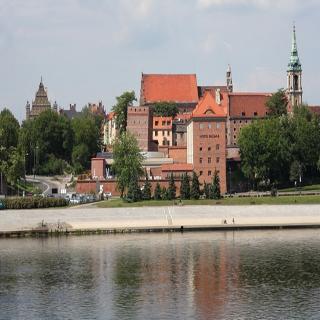
トルンホテル検索結果
AIが見つけた軒のホテルの最安値をご覧ください。
ベストホテル
最安値のホテル
ホテル等級
AIおすすめ
トルンベストホテル
トルン 最低価格のホテル
最高評価のホテル
トルンにある5つ星ホテル
トルンにある4つ星ホテル
トルンにある3つ星ホテル
AIがおすすめする世界の旅行先
トルン近くのホテル情報
トルン 旅行に欠かせない情報
Toruń [ˈtɔruɲ] ( listen) (German: Thorn) is a city in northern Poland, on the Vistula River. Its population was 202,591 as of June 2016. Previously it was the capital of the Toruń Voivodeship (1975–98) and the Pomeranian Voivodeship (1921–45). Since 1999, Toruń has been a seat of the self-government of the Kuyavian-Pomeranian Voivodeship and, as such, is one of its two capitals (together with Bydgoszcz). The cities and neighboring counties form the Bydgoszcz–Toruń twin city metropolitan area.
Toruń is one of the oldest cities in Poland, with the first settlement dated back to the 8th century and later having been expanded in 1233 by the Teutonic Knights. Over centuries, it was the home for people of diverse backgrounds and religions. At one point, the city was considered the most modern cultural and technological centre in Medieval Europe. From 1264 until 1411 Toruń was part of the Hanseatic League and by the 17th century it was one of the elite trading points, which greatly affected the city's architecture ranging from Brick Gothic to Mannerism and Baroque. In the early-modern age, the city was a royal city of Poland and it was also considered one of the four largest cities of Poland. After the partitions of Poland it was part of Prussia and later the German Empire. After Poland declared independence in 1918, Toruń was reincorporated into Polish territory, and during World War II it was one of the few cities in the country that sustained no damage. This allowed the Old Town to be fully preserved with its iconic central marketplace.Believed to be one of the most beautiful cities in Europe, Toruń is renowned for the Museum of Gingerbread, whose baking tradition dates back nearly a millennium, and its large Cathedral. Toruń is noted for its very high standard of living and quality of life. In 1997 the medieval part of the city was designated a UNESCO World Heritage Site. In 2007 the Old Town in Toruń was added to the list of Seven Wonders of Poland.
Toruń is the bir
 時間 UTC+02
時間 UTC+02 通貨 PLN
通貨 PLN 言語 Polish
言語 PolishStaypiaだけの特別な特典
リアルタイムホテル最安値比較
AIが見つけたin トルンの軒のホテルのリアルタイム最安値を簡単に比較検索できます。
316万軒のホテルを最安値で予約
最低価格に最大31%追加メンバーシップ割引でさらにお得にご予約いただけます。
自分だけの
AIがリアルタイムで更新するトルン旅行情報で便利に旅行を準備しましょう。
よくある質問
トルンで最も人気のある5つ星ホテルはCopernicus Torun Hotelです。 トルン 評価順にホテルを見る
一般的なホテルの場合、客室予約はキャンセル締切日前まで無料返金が可能です。キャンセル締切日以降は手数料が発生する場合がありますので、ホテルバウチャーまたはメニュー>マイ予約でキャンセル締切日をご確認ください。
ステピアでは、AIが収集した316万件のホテルの最安値はもちろん、会員限定の追加割引価格で人気ホテルを予約することができます。












